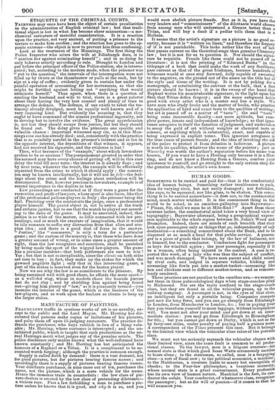MANUFACTURE OF PAINTINGS.
FRAUDULENT traffic in spurious works of art is no novelty, ex- cept to the public and the Lord Mayor. Mr. Herring has dis- covered that persons make copies or imitations of his pictures, and palm them off upon ill-judging customers. The practice de- frauds the purchaser, who buys rubbish in lieu of a thing valu- able; Mr. Herring, whose customer is intercepted; and the un- initiated public, which is taught that such productions as the un- real Herrings merit what judges say of the genuine article. The police disclosure only makes known what the well-informed have known constantly ; and Mr. Herring has but anticipated the honours of a Raphael or a Titian. It is a compliment to be ac- counted worth forging; although the practice is common enough. Supply is called forth by demand : there is a vast demand, not for good pictures, but for pictures bearing famous names ; and accordingly there is a supply of pictures bearing famous names. Your dilettante purchaser, in nine cases out of ten, purchases the name, not the picture, which is a mere vehicle for the name. Hence the immense trade in counterfeits : the low class of pic- ture-dealers is created by the low class of pretending dilettanti— a vicious race. Pass a law forbidding a man to purchase a pic- ture unless he knows that it is good, and roky it is so, and you would soon abolish picture frauds. But as it is, you have the very leaders and "commissioners" of the dilettante world chosen from among men who will understand a Greuze better than a Titian, and will buy a daub if a pedlar tells them that is a Holbein.
It seems that the artist's signature on a picture is no good se- curity, because it is "written on linen," and therefore the forgery of it is not punishable. This looks rather like the sort of law that passes current on the theatrical stage than genuine Chancery law ; but it is not for us to question it. Nor should the signa- ture be requisite. Frauds like these could not be passed off in literature : it is not the printing of "Edmund Burke" in the titlepage of a book that could make the work of any Scriblerus pass current as that of the great Irishman, because hundreds of witnesses would at once step forward, fully capable of swearing to the negative, on the ground not of the name on the title but of the style and tissue of the writing. It is not by poking for a monograph, or scrutinizing the canvass at the back, that a fine picture should be known : it is in the sweep of the hand that Raphael writes his unmistakeable signature, in the light upon his flesh that Titian defies forgery ; and the same safeguard holds good with every artist who is a master and has a style. We have men who study books and the matter of books, who practise the application of hard and exact tests to the qualities of writing; but art is passed off as a matter of "taste"; the said "taste" being some inscrutable faculty—not mere aptitude, but com- plete power, innate and independent of knowledge ; so that igno- rance arrogates to itself the function of judgment, and undertakes to assay the gold of art without weights or chemical tests or science, or anything which is substantial, exact, and capable of being expressed in explicit terms. This ignorant arrogance is the true cause of picture frauds ; and the idea of invoking the aid of the police to protect it from delusion is ludicrous. A picture is worth its qualities, whatever the name of the painter ; just as Waverley was worth the author's reputation before his name was known. If you want to have a Herring only becasue it is a Her- ring, and do not know a Herring from a Greuze, confess your ignorance to yourself, and go straight to the only certain shop for the genuine article, the artist's own house.


























 Previous page
Previous page